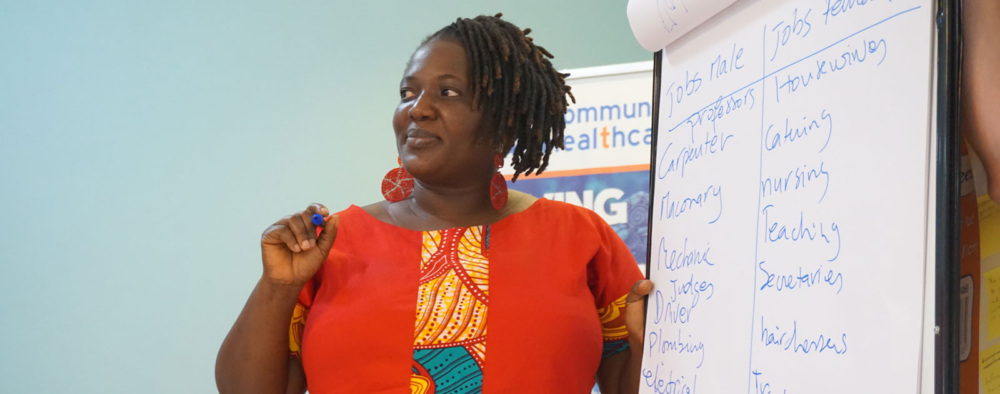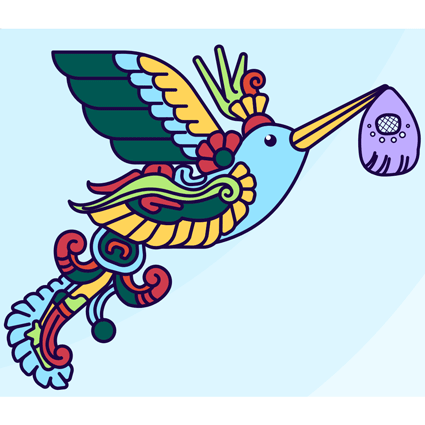
Justiça de gênero
Justiça de gênero, segurança e bem-estar
Nota do editor: Este blog também está disponível em Espanhol.
A campanha por justiça de gênero é um compromisso global. Embora deva levar em conta contextos culturais específicos e começar de uma base comunitária forte, ela envolve todos nós.
Todos nós temos a enorme responsabilidade de criar novos espaços de justiça, questionando e desmantelando privilégios e abrindo canais de diálogo que nos permitam construir relacionamentos livres de violência e discriminação.
No Global Fund for Children, a luta pela justiça de gênero é um compromisso diário. É o impulso constante para construir um mundo no qual jovens de todos os gêneros se sintam seguros e valorizados e tenham as mesmas oportunidades de construir vidas plenas, não importa onde vivam.
Desde 1997, trabalhamos com organizações de base e líderes locais para impulsionar mudanças sociais por meio de programas enraizados nas necessidades e contextos únicos de suas comunidades. Nosso trabalho de promoção da justiça de gênero abrange mais de duas décadas e inclui iniciativas projetadas para mudar atitudes de gênero na América Latina, combater o tráfico na Índia, e promover masculinidades saudáveis na Inglaterra.
Em 2020, iniciamos uma iniciativa regional na África Ocidental, em parceria com oito organizações de base localizadas em áreas rurais da Libéria e Serra Leoa. Essas organizações lideradas por mulheres e jovens estão enfrentando a violência contra meninas em suas comunidades, ao mesmo tempo em que capacitam as meninas a exercer agência e autonomia sobre seus corpos e suas vidas.
[image_caption caption=”O gerente do programa Rodrigo Barraza posa para uma foto com os participantes da reunião durante a segunda reunião regional da iniciativa Acabando com a Violência Contra Meninas na África Ocidental. © Global Fund for Children” float=””]
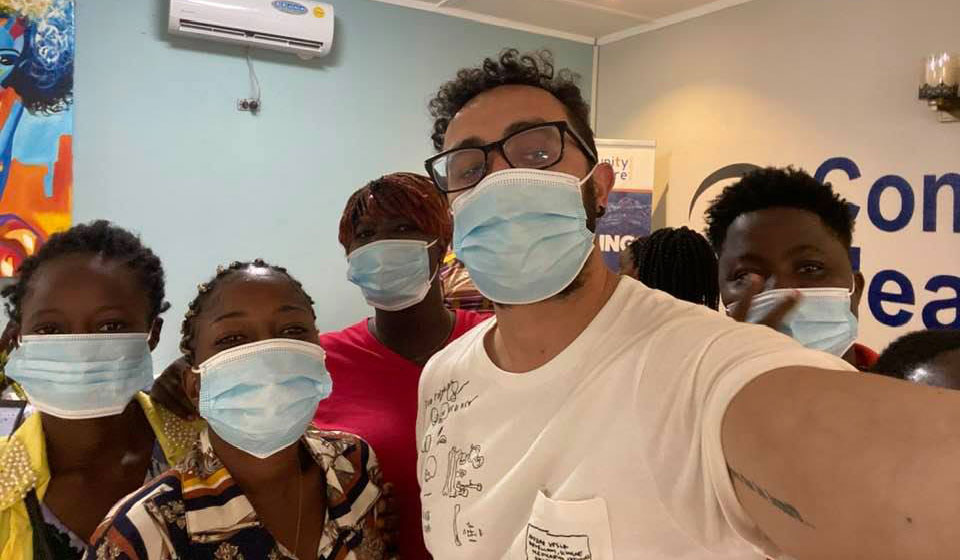
[/imagem_legenda]
Como qualquer iniciativa poderosa de mudança social, esta começou com perguntas:
Como conectamos oito organizações, operando em diferentes contextos, e com diferentes agendas e estratégias, para trabalhar juntas de forma coordenada pela justiça de gênero? Como transcendemos ações locais específicas para criar movimentos efetivos para mudança social?
A busca para responder a essas perguntas nos forçou a olhar para dentro. Descobrimos que a melhor maneira de responder era gerar novas perguntas. Essa é a mágica das perguntas: elas sempre nos ajudam a seguir em frente.
E se começarmos por nós mesmos? E se promovermos colaborações mais amplas entre equipes que nos permitam entender a violência de gênero como um problema global e que, ao mesmo tempo, nos permitam compartilhar conhecimento, promover o aprendizado colaborativo, alimentar a advocacia e enfrentar as causas raiz?
É aqui que a aventura começa.
Depois de mais de três anos no GFC promovendo a justiça de gênero e a construção de masculinidades saudáveis no México, Guatemala e Honduras, recebi um convite da equipe da África do GFC para compartilhar metodologias e lições aprendidas na segunda reunião regional do Iniciativa para acabar com a violência contra as meninas na África Ocidental. Os principais objetivos do encontro de dezembro de 2020 foram refletir sobre os processos de construção e reprodução de estereótipos de gênero e fortalecer o protagonismo juvenil dentro das organizações.
O convite foi resultado de um profundo processo de reflexão interna em que nós, como equipe, identificamos inúmeras similaridades entre nossas iniciativas regionais e entre os esforços que nossos parceiros realizam em diferentes partes do mundo. Era hora de arriscar e apostar em diálogos interculturais mais profundos. Afinal, somos Global Fundo para Crianças – não uma soma de esforços desconexos, mas uma rede de colaboração e apoio mútuo.
Minha primeira reação foi uma mistura de excitação e nervosismo. Era minha primeira viagem à África Ocidental, e eu sabia muito pouco sobre uma região tão diversa e complexa.
[image_caption caption=”Os participantes da reunião juntaram as mãos. © Global Fund for Children” float=””]
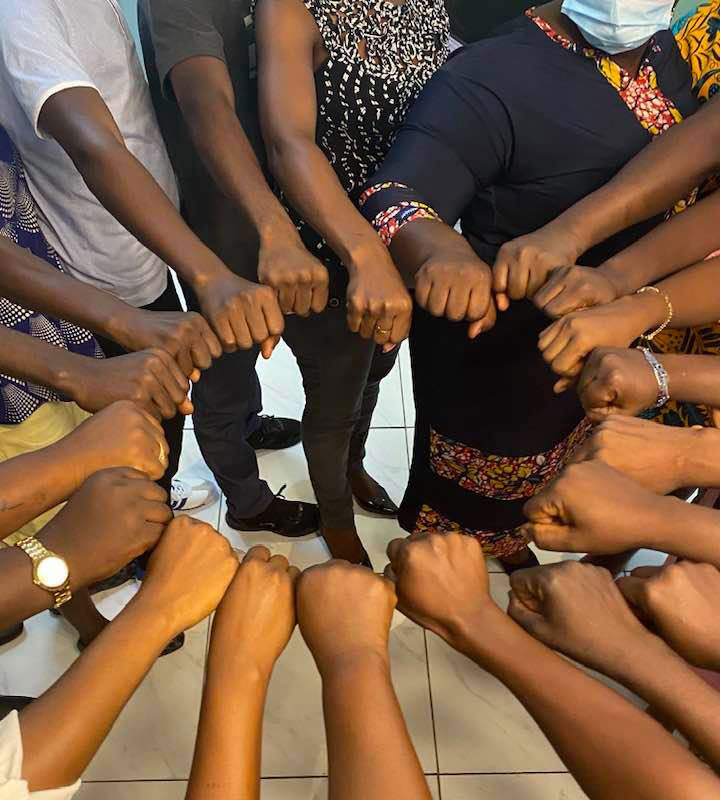
[/imagem_legenda]
Logo enfrentamos o primeiro desafio: como viajar do México para a Libéria durante a pandemia da COVID-19. Seria possível?
Foram as palavras do meu maravilhoso colega Amé Atsu David, uma especialista em gênero baseada na Libéria e coordenadora da nossa iniciativa Ending Violence Against Girls in West Africa, que restaurou minha força e esperança. “Se houver vontade”, ela disse, “tudo é possível”.
Depois de centenas de ligações para companhias aéreas, embaixadas e aeroportos, e três testes de COVID-19, três voos e 35 horas depois, o primeiro objetivo foi alcançado: eu estava na Libéria.
Foi a primeira vez que Amé e eu nos encontramos pessoalmente, embora já tivéssemos compartilhado muitas horas de diálogo e planejamento via Zoom.
Fiquei tão animada! Tudo parecia novo para mim, e eu tinha muitas perguntas sobre a Libéria, sobre o trabalho dos nossos parceiros e sobre a comida. Amé foi muito paciente e generosa. Graças às suas respostas e às nossas caminhadas diárias, este novo mundo de repente começou a parecer familiar. Eu não me sentia mais como uma estranha.
O processo de planejamento para a convocação foi divertido e produtivo. Amé e eu acreditamos que gênero não é um treinamento, mas uma experiência vivida, então desenvolvemos metodologias participativas – baseadas em jogos e atividades – que promoveriam reflexão profunda e se traduziriam em ação.
Finalmente, o dia chegou! Era hora de conhecer os parceiros e começar nossa reunião de quatro dias. Os nervos e as perguntas retornaram. E se eles não me aceitarem? E se não nos entendermos? E se eu realmente não tiver nada para fazer aqui e minha experiência for inútil?
[image_caption caption=”Uma das atividades durante a reunião envolveu traçar as mãos dos participantes. © Global Fund for Children” float=””]
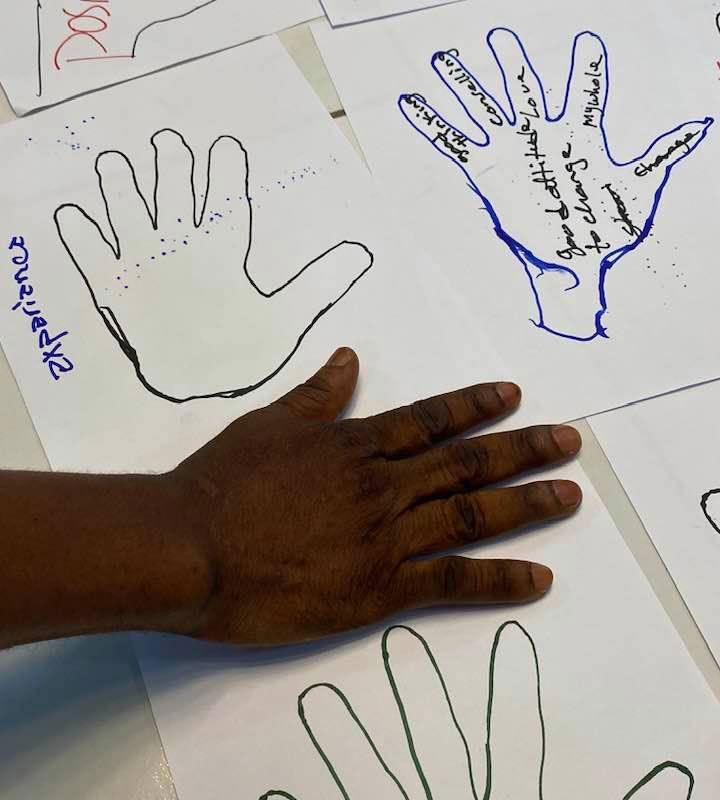
[/imagem_legenda]
Nossos parceiros me deram a resposta.
Com sua energia, seu bom humor, suas risadas, suas canções, sua dança, sua criatividade e seus desenhos, eles me mostraram que eu não precisava me preocupar.
Olhamos uns para os outros, nos reconhecemos e aprendemos a ouvir uns aos outros. Compartilhamos nossas muitas experiências e então identificamos os aprendizados que poderíamos levar para nossos contextos e lutas específicos, e aqueles que não poderíamos.
Mais importante ainda, percebemos que algo muito profundo – que transcende fronteiras, idiomas e culturas – nos une a todos: nosso sonho compartilhado de construir um mundo melhor para meninas e mulheres jovens.
Esse vínculo que agora nos conecta é impossível de quebrar.
No final do encontro, escrevemos uma carta para meninas na África, na América Latina e em todo o mundo:
[image_caption caption=”Participantes da reunião escrevendo uma carta para meninas. © Global Fund for Children” float=””]
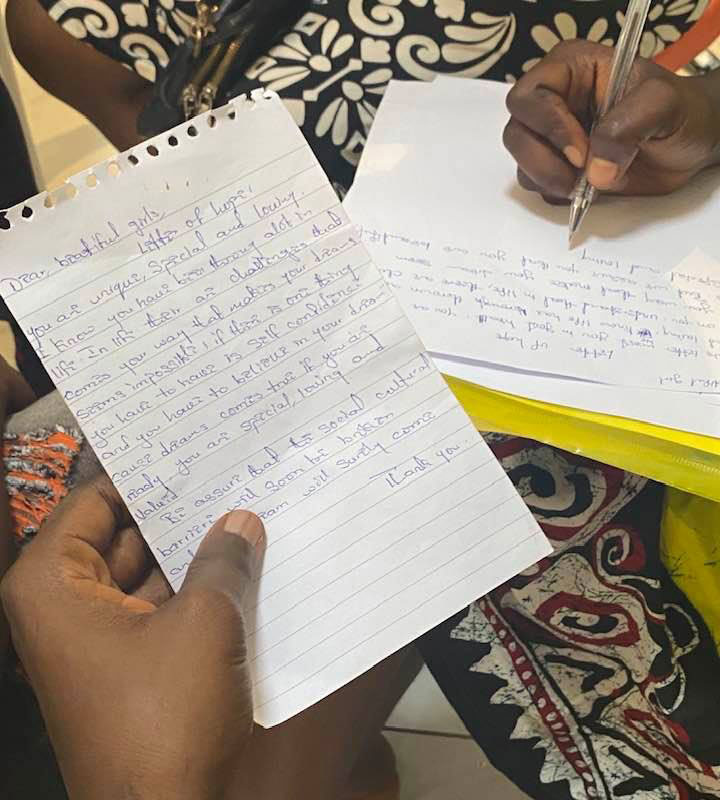
[/imagem_legenda]
Você é forte, você é corajosa, você é especial, você é única e você é linda. Não desista. Continue lutando porque sua família precisa de você, seu país precisa de você e o mundo precisa de você.
E lembre-se, você não está sozinho nessa luta. Acreditamos na sua visão e temos fé nos seus sonhos.
Na GFC, continuaremos a construir pontes de colaboração entre parceiros e dentro de nossa equipe. Ao apoiar uns aos outros, ouvir uns aos outros e trabalhar juntos, aprendemos a apoiar, ouvir e trabalhar melhor com e para crianças e jovens em todas as regiões.
Agora, sabemos que também não estamos sozinhos. Somos um só coração e uma só voz, do México à Libéria, aos Estados Unidos – e a qualquer outro lugar com pessoas comprometidas que lutam por esperança, justiça e dignidade.
Com foco na Serra Leoa rural e na Libéria, a iniciativa Acabar com a Violência Contra Meninas na África Ocidental visa abordar as causas profundas da violência contra meninas, capacitando meninas adolescentes a promover seus direitos. Esta iniciativa é uma parceria entre a Fundação NoVo, Loteria do Código Postal do Povo, e crise financeira global.
Foto do cabeçalho: Especialista em Desenvolvimento de Capacidade Regional do GFC, Amé Atsu David, liderando uma atividade durante a segunda reunião regional da iniciativa Acabando com a Violência Contra Meninas na África Ocidental. © Fundo Global para Crianças
